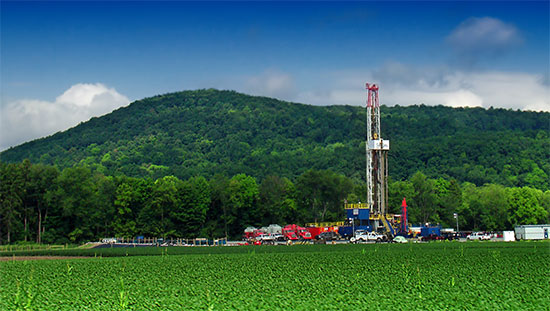Report recommends further research to determine effects of "fracking" in Bay watershed
Much remains unknown about the impact of hydraulic fracturing on land and water.
While research continues to shed light on the environmental effects of shale gas development, much more remains unknown about the risks that the process known as “fracking” could pose for the Chesapeake Bay watershed.
According to a report released this week by a panel of scientific experts, additional research and monitoring—on sediment loads, on forest cover, on the best management practices that might lessen fracking’s environmental impact and more—must be done to determine how hydraulic fracturing might affect land and water resources in the region.

Image courtesy Wikimedia Commons
Hydraulic fracturing is a process that works to extract natural gas and oil from beneath the earth’s surface. During the process, a mixture of water, sand and additives is pumped at high pressure into underground rock formations—in the watershed, this formation is known as the Marcellus Shale—breaking them apart to allow the gas and oil to flow into wells for collection.
The process can impact the environment in a number of ways. According to the report, installing shale gas wells requires clearing forests and building roads, which can impact bird and fish habitat and increase the erosion of sediment into local rivers and streams. Withdrawing water from area sources—an essential part of gas extraction, unless water is brought in from off-site—can alter aquatic habitat and river flow. And the drilling process may result in the accumulation of trace metals in stream sediment.
Read more about the environmental effects of shale gas development in the watershed.

Comments
Don't forget the air -- the exhaust from numerous trips by trucks (thousands of trips per well drilled), drilling rigs, generators and compressors will contain oxides of nitrogen (and other contributors smog) that, in due course, will be deposited across the landscape and wind up in our surface waters.
In terms of water impacts, the "state of the art" may be evolving in an encouraging way given Haliburton's recent announcement of a non-toxic fracking fluid comprised of food industry products. See: http://www.dallasnews.com/business/energy/20130203-halliburton-offers-nontoxic-fracking-fluid.ece
Nevertheless, continuous monitoring and further independent study is always prudent.
Thank you!
Your comment has been received. Before it can be published, the comment will be reviewed by our team to ensure it adheres with our rules of engagement.
Back to recent stories